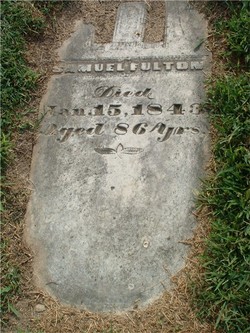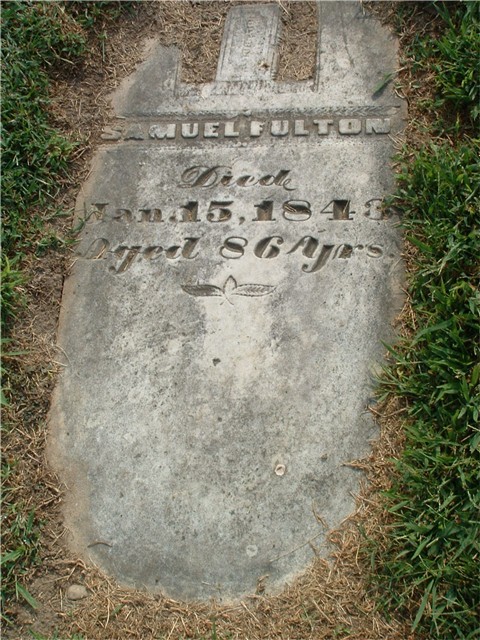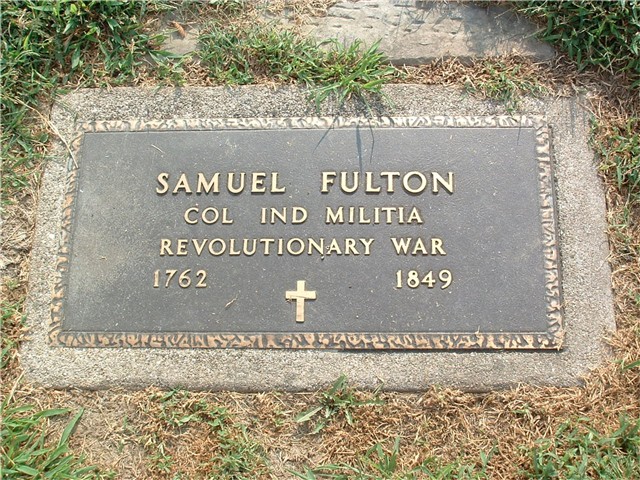At the close of the (Revolutionary) war the surviving members of the family were reunited and settled in Cumberland County, PA near Harrisburgh, when Samuel Fulton was married to Mary Huston, who shared with him the privations of pioneer life in Indiana for more than a third of a century. She died August 13, 1834, aged sixty seven years.
In the summer of 1794 the same party that made the first settlement in 1798, where Rising Sun now stands, left Cumberland County, Penn., for the west...
They [eventually] located on the present site of Rising Sun...
The first white persons to take up their abode where Rising Sun now stands were John Fulton and his wife, their sons Samuel and Thomas and their families, and Christopher Huston and his family.
Samuel Fulton, who was a resident of the immediate vicinity of Rising Sun for a full half century afterward, in the year 1798 built the first cabin in this vicinity, on the bank of the Ohio River, at the foot of what is now Sixth Street.
Samuel Fulton remained where he first located until about 1811, when he removed to the farm about one mile north of Rising Sun, where he resided at the time of his death in 1849.
[He] maintained during a long and eventful life an unimpeachable public and private moral character. It is a strong evidence of the purity and strength of his principles, that in the early settlement of this country, where there were so many inducements to lead astray, he was uniformly temperate and moral. In all the relations of life, he acted with fidelity, and lived and died an honest man, "the noblest work of God.
(From "History of Dearborn and Ohio Counties, Indiana, 1885")
At the close of the (Revolutionary) war the surviving members of the family were reunited and settled in Cumberland County, PA near Harrisburgh, when Samuel Fulton was married to Mary Huston, who shared with him the privations of pioneer life in Indiana for more than a third of a century. She died August 13, 1834, aged sixty seven years.
In the summer of 1794 the same party that made the first settlement in 1798, where Rising Sun now stands, left Cumberland County, Penn., for the west...
They [eventually] located on the present site of Rising Sun...
The first white persons to take up their abode where Rising Sun now stands were John Fulton and his wife, their sons Samuel and Thomas and their families, and Christopher Huston and his family.
Samuel Fulton, who was a resident of the immediate vicinity of Rising Sun for a full half century afterward, in the year 1798 built the first cabin in this vicinity, on the bank of the Ohio River, at the foot of what is now Sixth Street.
Samuel Fulton remained where he first located until about 1811, when he removed to the farm about one mile north of Rising Sun, where he resided at the time of his death in 1849.
[He] maintained during a long and eventful life an unimpeachable public and private moral character. It is a strong evidence of the purity and strength of his principles, that in the early settlement of this country, where there were so many inducements to lead astray, he was uniformly temperate and moral. In all the relations of life, he acted with fidelity, and lived and died an honest man, "the noblest work of God.
(From "History of Dearborn and Ohio Counties, Indiana, 1885")
Advertisement
Records on Ancestry
Sponsored by Ancestry
Advertisement






